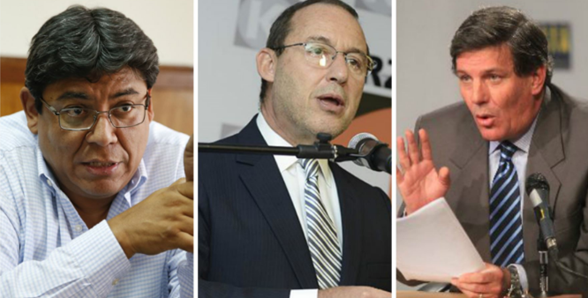The election in Congress Thursday of three new governors to Peru’s Central Bank has been met with loud protests from the minority opposition in the Congress and also criticism from political analysts and some business circles.
The Fujimoristas, with a clear majority of 71 seats in the 130-member house, plus the five members of the Apra party, called a rush vote to elect their candidates, overriding the harsh criticism from the left-wing Frente Amplio and the Accion Popular lawmakers. Marisa Glave of Frente Amplio had proposed the vote take place on Friday.
“You get the sensation that the 90s have returned,” said Jhony Lescano of Accion Popular, alluding to the Alberto Fujimori administration’s way of pushing through its preferences.

The new governors, elected from five candidates, are economist Elmer Cuba, head of the Macroconsult firm and slated to be Finance minister in a Keiko Fujimori government; prominent agroexporter Jose Chlimper, who is secretary general of the Fujimori party Fuerza Popular and was briefly minister of Agriculture at the end of the Fujimori regime in 2000; and politician Rafael Rey, who has no financial experience but was Defense minister during Alan Garcia’s second administration and is a strong Fujimori supporter, who was presented as a candidate by the five APRA members in Congress.
The well-regarded Cuba got 84 votes, but both Chlimper and Rey won with only the Fujimorista and Apra votes. The candidates only required 66 votes to be elected.
Although Chlimper has served on the BCR board before (2006-2011) and President Kuczynski quicly said today that he is “very qualified for the job, ” the business weekly Semana Económica questions his suitability not only because of his aggressive criticism of the Kuczynski administration via social media but for his involvement in the case of a tampered recording used to defend Joaquin Ramirez, the main financier of Keiko Fujimori’s presidential campaign who is under investigation both by Peruvian police and the FBI for money laundering.
Semana Economica points out that the tampered recording case is still under investigation and Chlimper may not be criminally charged but that, more importantly, Chlimper has since lost credibility and that affects the reputation of the BCR.
Rafael Rey also carries political baggage from his days as Defense minister, and for his harsh criticism of human rights defenders.
Critics of both Chlimper and Rey say that neither fit the BCR job description, citing article 11 of the Bank’s statutes: “The Directors must be Peruvian, have recognized integrity and have broad competency and experience in economy and finance. They do not represent any vested interested or entity and their vote must only take into account the fulfillment of the purpose and functions of the Bank.”





